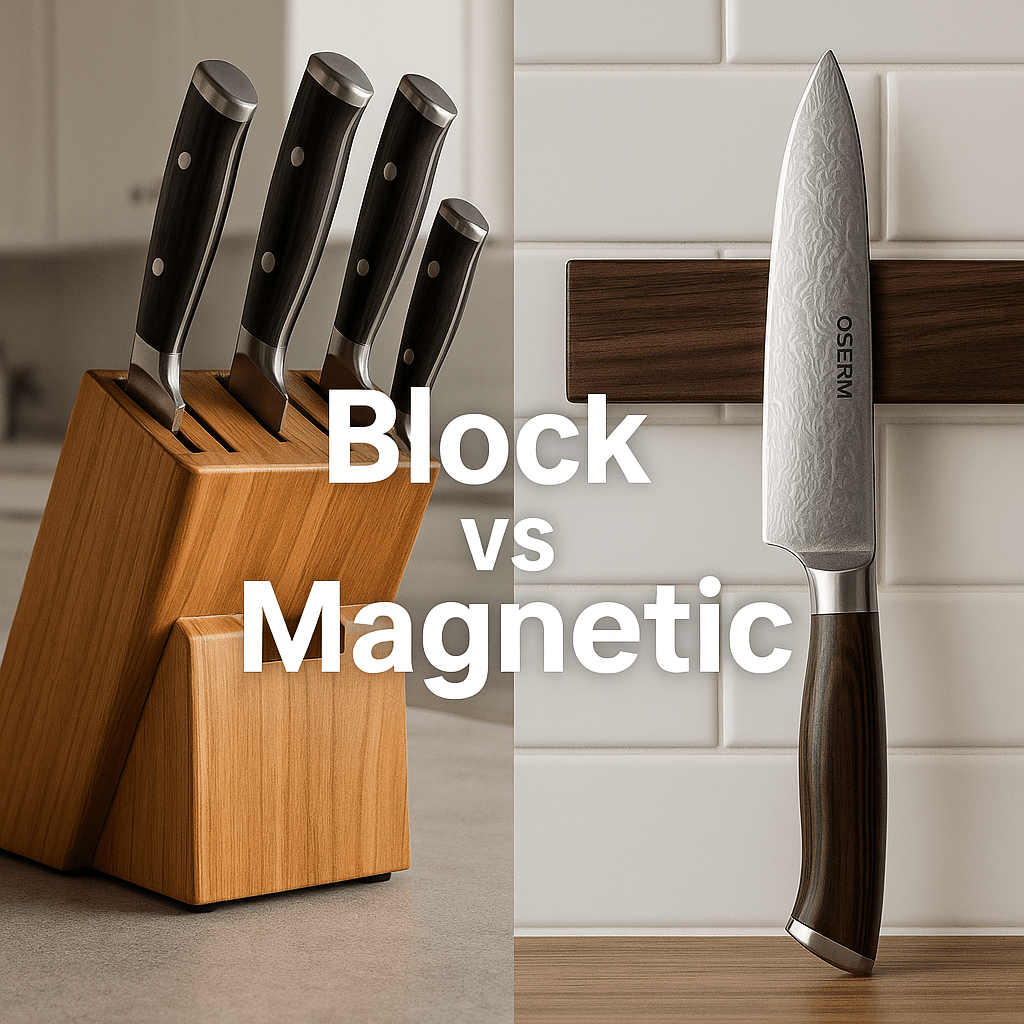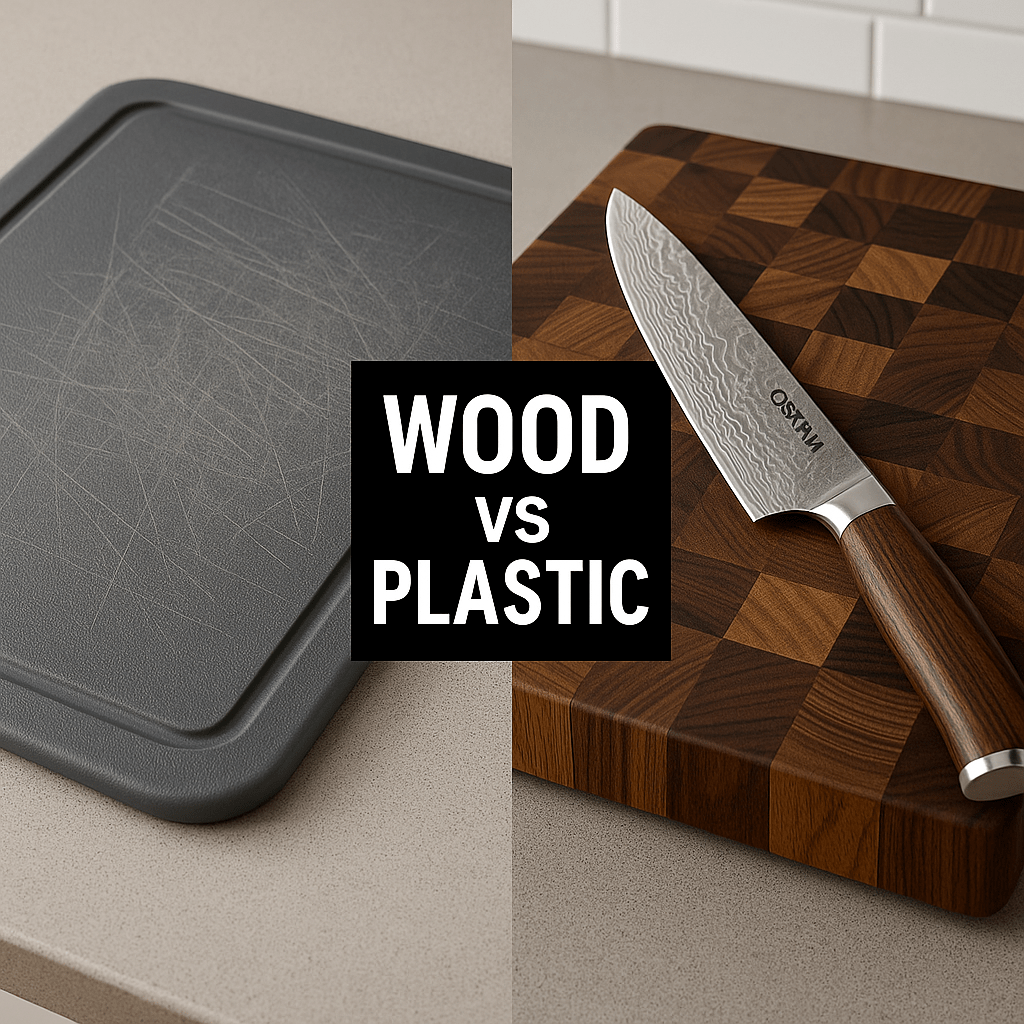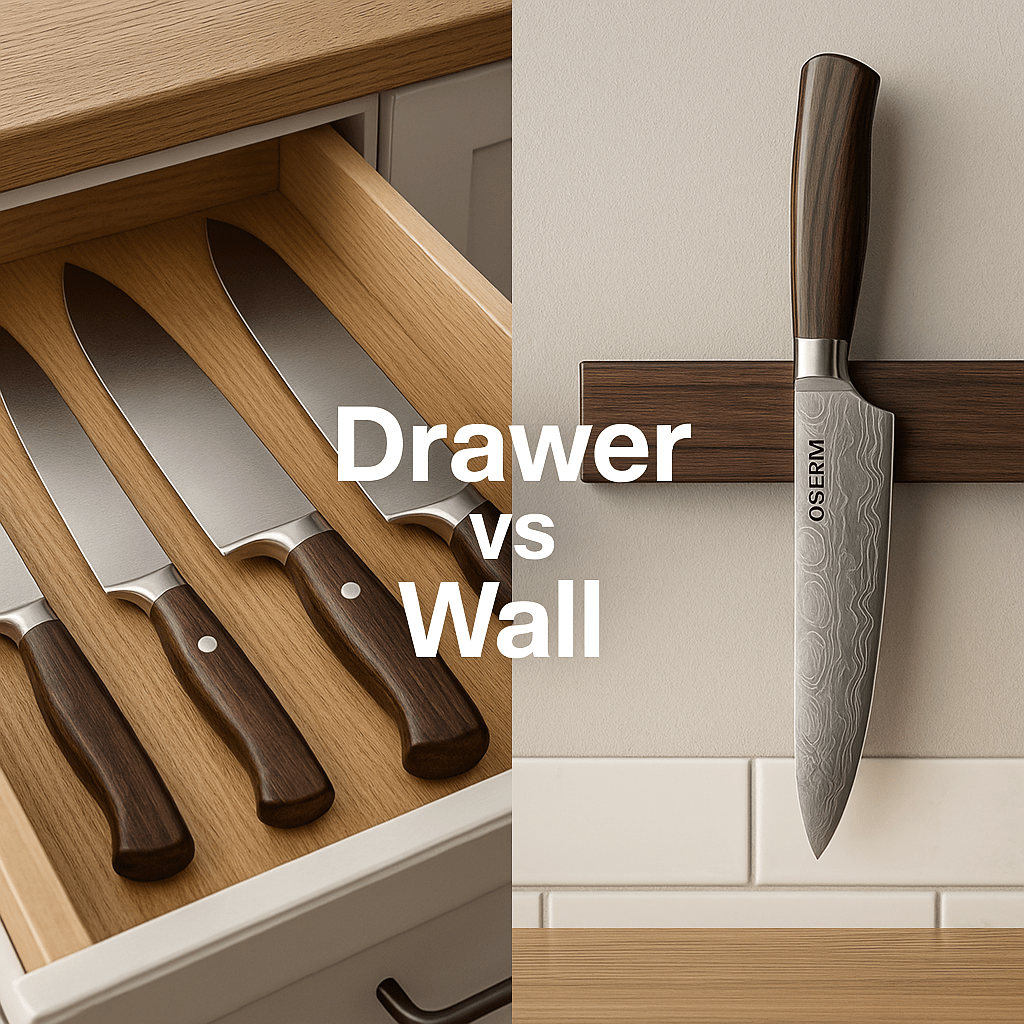
How to Store Your Knives – Knife Block vs Magnetic Strip
Your kitchen knives are precision tools — elegant, sharp, and crafted for performance. But even the finest OSERM Damascus knife can lose its edge or sustain damage if not stored properly. While most home cooks use either a knife block or a magnetic knife strip, few realize how dramatically these storage methods can affect both safety and blade longevity. Let’s explore which is best for your knives and your kitchen.
1. Why Proper Knife Storage Matters
Every knife deserves protection — not just from rust or scratches, but from unnecessary dulling. Improper storage, like tossing knives into a drawer, can damage both the edge and your hands. Blade-to-blade contact chips fine steel, and moisture buildup can lead to corrosion, especially in high-carbon Damascus knives.
Good storage should provide three things: protection, accessibility, and airflow. Let’s see how the two main methods compare.
2. Knife Blocks: The Traditional Option
The knife block has been a kitchen staple for decades. It’s convenient, compact, and adds a classic aesthetic to countertops. You simply slide each knife into its slot, keeping blades hidden and organized.
- Pros: Easy to access, keeps blades safe from accidental contact, blends with most kitchen styles.
- Cons: Hard to clean, potential for moisture buildup, can dull edges when sliding in/out.
While wooden knife blocks look appealing, they can harbor hidden moisture and bacteria — especially if knives are stored slightly damp. Over time, friction from inserting knives can also wear down the delicate edge.
OSERM’s Tip:
If you prefer a knife block, choose one with horizontal slots rather than vertical. Horizontal slots reduce friction on the edge and help preserve sharpness. Clean the slots regularly and ensure all knives are completely dry before storage.
3. Magnetic Strips: The Modern Choice
Magnetic knife strips (or magnetic knife racks) have become increasingly popular among modern chefs and design-conscious home cooks. These sleek wall-mounted tools use strong magnets to hold knives securely while displaying their craftsmanship — especially ideal for Damascus steel knives.
- Pros: Hygienic, easy to clean, space-saving, highlights the knife’s design.
- Cons: Requires wall mounting, may chip edges if knives are placed carelessly, magnets must be strong but smooth.
A well-designed magnetic strip not only protects the blade but also keeps it ventilated, reducing the risk of rust. For OSERM Damascus knives, this method allows you to showcase the knife’s stunning pattern while ensuring quick accessibility for cooking.
4. Magnetic vs Traditional: Which Wins?
| Feature | Knife Block | Magnetic Strip |
|---|---|---|
| Edge Protection | Moderate (risk of dulling) | Excellent (no contact with slot edges) |
| Hygiene | Hard to clean inside slots | Very hygienic and easy to wipe down |
| Aesthetic Appeal | Classic, traditional | Modern, elegant display |
| Space Efficiency | Takes up counter space | Wall-mounted, saves space |
| Knife Longevity | Good if maintained | Best when handled properly |
5. OSERM’s Recommendation
For those who own OSERM Damascus knives, we recommend a magnetic knife strip made from natural wood — such as walnut or acacia. These materials are gentle on the blade and complement the visual beauty of Damascus steel. Choose a strip with strong embedded magnets and a smooth wooden surface (not metal-on-metal) to avoid scratches.
If you prefer a knife block, opt for OSERM’s angled wooden block design with wider slots and ventilation holes to promote airflow and prevent trapped moisture.
6. Safety & Maintenance Tips
- Always dry your knives thoroughly before placing them on a magnetic strip or in a block.
- When using a magnetic strip, let the knife’s spine (not the edge) make first contact with the magnet.
- Never store knives in drawers without blade guards — it’s dangerous and dulls them instantly.
- Wipe the magnetic strip regularly to remove dust or oil buildup.
7. The Beauty of Displaying Your Knives
One of the greatest joys of owning OSERM knives is their beauty — from the hand-polished blade to the wood-and-resin handle. A magnetic strip not only protects your knives but turns them into functional art, reflecting your passion for craftsmanship and culinary precision.
Conclusion
Both knife blocks and magnetic strips have their place, but for modern kitchens and Damascus knives, magnetic strips take the lead. They combine elegance, hygiene, and functionality — the perfect complement to the artistry of OSERM knives.
After all, how you store your knives says as much about your cooking philosophy as how you use them.
Weekly Deal 🔥
Enhance your kitchen setup with the OSERM Magnetic Knife Strip — precision-built to match your Damascus collection. Free shipping for this week only!
Shop OSERM Magnetic Knife Holders →
You Might Also Like
- Wooden vs Plastic Cutting Board – Which Protects Your Knives Better?
- Knife Care 101 – How to Keep Your Knives Razor-Sharp
- Damascus Knife vs Stainless Steel Knife – Pros & Cons
Tags: knife storage, knife block vs magnetic strip, OSERM knives, Damascus knife care, kitchen organization, magnetic knife holder, knife maintenance






